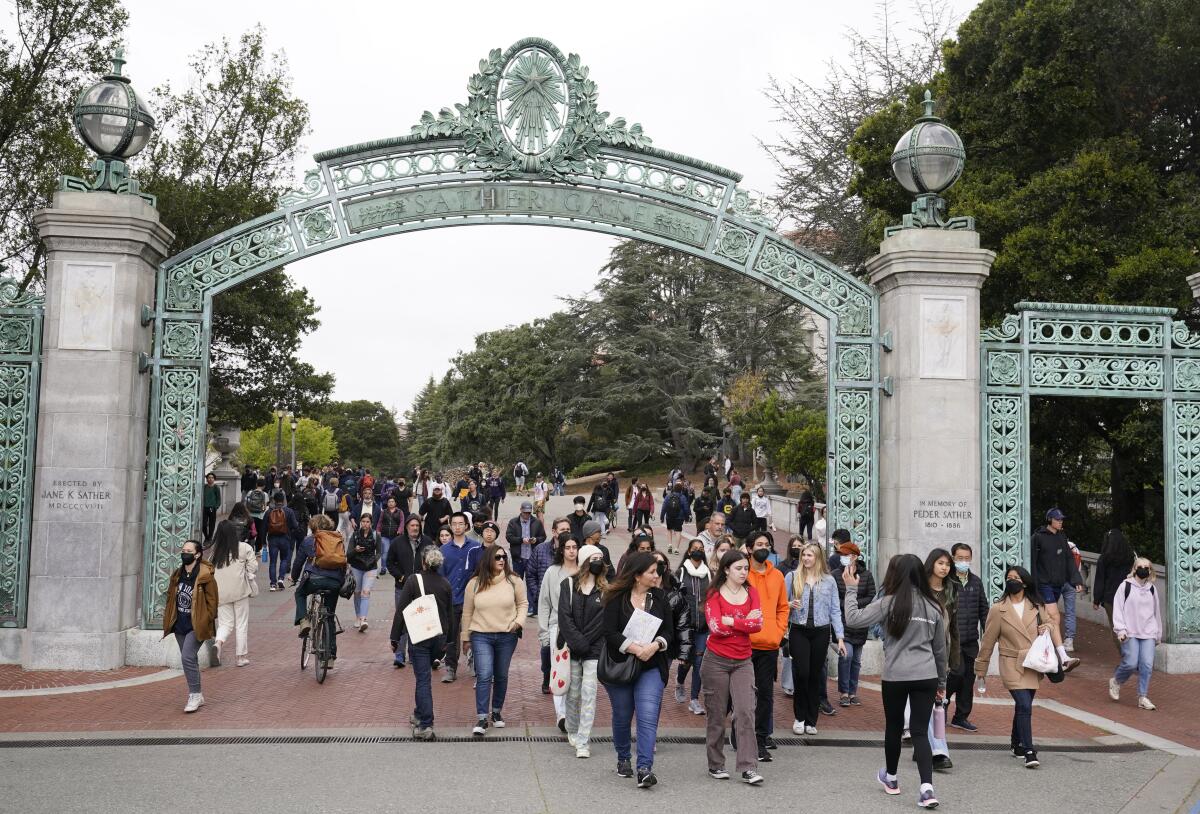Op-Ed: When a Berkeley Law debate on free speech got turned into a social media circus

- Share via
The great complexity of free speech issues on campus was revealed this semester at Berkeley Law. How are the free speech rights of a student group to not invite speakers with particular views to be balanced against the desire to have all viewpoints expressed and have no one feel excluded?
Although the legal and constitutional answers are relatively straightforward, dealing with it within an institution is a different matter, especially on deeply divisive questions that end up mobilizing the social media outrage machine, with all of its distortions and background of menace.
Here is what happened: In August, a law student group at Berkeley Law, the Law Students for Justice in Palestine, asked other student groups to adopt a bylaw excluding any speaker who, “expressed and continued to hold views or host/sponsor/promote events in support of Zionism, the apartheid state of Israel, and the occupation of Palestine.”
Op-Ed: In going after UCLA, the Trump administration is attempting to chill free speech about Israel
Anti-Semitism is a real and growing danger. But it shouldn’t be confused with anti-Zionism.
This was very upsetting to many of our students and faculty, though the great majority were unaware of this controversy. For most Jews, including me, the existence of Israel and Zionism are an important part of our Jewish identity, and the bylaw was felt as antisemitism. I wrote a letter to the leaders of all student groups explaining that while I strongly supported their speech rights, I thought the bylaw was inconsistent with our values as a law school, our commitment that all viewpoints be expressed and our desire that every student feel included in all aspects of the school.
There was a brief flurry of media attention, but the issue quickly faded. Within the law school conversations continued about how best to balance free speech rights with maintaining a culture of mutual respect and diversity of opinion.
Then, in late September, an article appeared in the Jewish Journal with the headline “Berkeley Develops Jewish-Free Zones.” This was nonsense, and the article is filled with distortions. There are no Jewish-free zones at UC Berkeley or Berkeley Law. The law school has an explicit policy that every student group and every student event must be open to all students. I know of no instance in which any speaker has been excluded based on religion or viewpoints about Israel.
But the Jewish Journal story went viral. This image of Berkeley Law could not be further from reality. Many lamented the absence of speakers supporting Israel, never acknowledging programs at the law school and the campus, such as the Helen Diller Institute for Jewish Law and Israel Studies, which frequently hosts speakers and visiting scholars from Israel.
What should school administrators do in this situation?
Many demanded that the law school adopt a position that student groups cannot exclude speakers based on their viewpoint and that the student groups that adopted the bylaw be punished. But this cannot be reconciled with the 1st Amendment or even common sense.
Of course, student groups can decide what speakers to include based on their views. Obviously, a college Republicans’ group could decide only to invite conservative speakers. To require student groups to invite speakers of views they loathe would violate the 1st Amendment as a form of compelled speech.
At the same time, no student group can exclude any speaker on the basis of race, religion, sex or sexual orientation. That would violate law school and campus policy, as well as state and federal law. Such discrimination would be punished.
But because the situation at Berkeley Law is about choosing speakers based on their viewpoints, the student groups have the 1st Amendment right to reject views they oppose. This would be true for a women’s law students association deciding to invite only speakers who support abortion rights and that effectively excluded many Catholic speakers, which might well make students of that religion feel uncomfortable.
This is not to deny that the effect of the bylaw, if it were followed, would be to exclude many Jewish speakers and would make Jewish students uncomfortable being part of some groups. That is why I condemned it. I wish student groups would not adopt such policies, but a public university cannot prohibit them.
All of this would be difficult enough without outside agitators seizing on this and targeting our students for harassment and threats. Some of our students of color, Muslim students and Jewish students have received hateful and threatening messages.
Right-wing Israeli leaders refuse to meet with Palestinians. But there will be no solution unless Israel recognizes Palestinians’ national rights.
A right-wing group has had a truck going around the law school with awful billboards. One said, “If you want a Jewish Free Berkeley, raise your right hand,” with a large picture of Hitler. Another truck listed the names of students from organizations that adopted the bylaw under the banner, “Berkeley Law’s Antisemitic Class of 2023.” It is despicable to target students in this way, and it understandably has caused many students to feel unsafe being on campus.
What started as an internal matter, where we were deepening the conversation among our students, faculty and staff about an enormously difficult issue and about how best to support one another, now requires our campus public safety professionals to monitor threats and provide security support for our targeted students. Not only has the marketplace of ideas failed to generate accurate discussions of our situation, it has created a truly dangerous environment.
What we have been experiencing could happen on any campus and reflects the difficult free speech issues confronting our society.
There are no easy paths to take. But I am convinced that as campus administrators we have to constantly express our values: our commitment that educational institutions be places where all views can be expressed and where all students feel included. But making that a reality seems harder than ever before.
Erwin Chemerinsky is a contributing writer to Opinion and dean of the UC Berkeley School of Law. His latest book is “Worse than Nothing: The Dangerous Fallacy of Originalism.”
More to Read
A cure for the common opinion
Get thought-provoking perspectives with our weekly newsletter.
You may occasionally receive promotional content from the Los Angeles Times.











